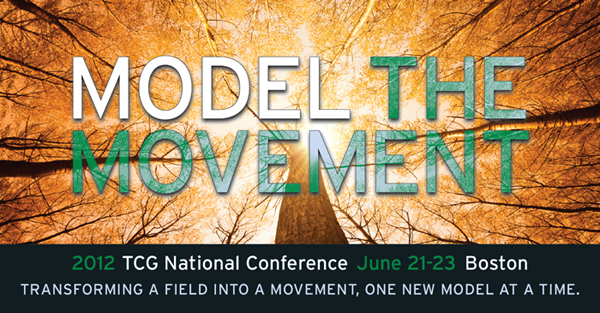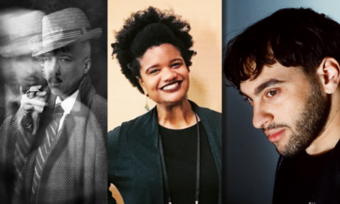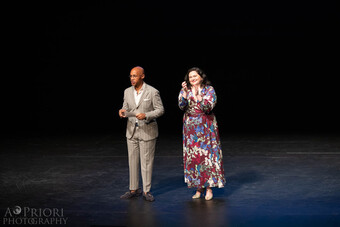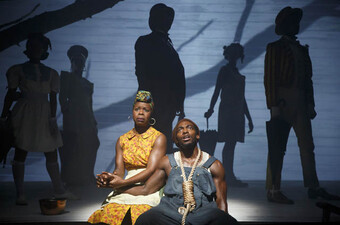Breaking Through the Bottleneck
Theatre Makers in the Black Community Congregate to Change Dynamics in Boston
On Tuesday, July 17, eighteen theatre makers in Boston’s black community gathered at the Calderwood Pavilion to reverse the energies expelling them to the edges. They gathered to change the landscape of audiences who experience their work, to change how they communicate with each other, to change their lack of presence in the field, and most importantly to change themselves.
The significance of the eighteen people in the room was magnanimous even if this number may be considered small by some measure. Everyone in attendance had self-selected to be there—followed an inspiration, a frustration, a need for more work, more stages, more audience, more youth, more scholars, more funding, more support, more community—essentially a need for each other.
As the door to the Arts Resource Room in the Calderwood Pavilion opened, I was greeted by an all-star cast of Boston’s black theater makers:
- John Adekoje (filmmaker/playwright/educator)
- Jessica Chance (actor)
- David Curtis (actor/musician & filmmaker)
- Lydia Diamond (playwright/professor, Boston University)
- Kirsten Greenidge (playwright)
- Maria Hendricks (actor/activist)
- Obehi Janice (actor/producer/playwright & solo performer, Fufu + Oreos)
- Sonya Smith Joyner (actor)
- Allyssa Jones (acting senior program director for the arts, Boston Public Schools)
- Terrence Kidd (playwright/co-founder, Proscenium Playwrights, Lesley University)
- Barbara Lewis (director, Trotter Institute at UMass Boston & co-founder, Boston Black Theater Collective)
- Monica White Ndounou (scholar/director, Tufts University)
- Mwalim Peters (playwright/director/storyteller/professor, UMass Dartmouth)
- Lisa Simmons (founder, Roxbury Film Festival and co-founder Boston Black Theater Collective)
- Phyllis Smith (AEA stage manager/associate production manager, Boston Center for the Arts)
- Beverly Morgan Welsh (executive director, Museum of African American History)
- Summer Williams (director/co-founder, Company One)
Anyone who knows the history of diversity in Boston knows that a bottleneck effect exists that causes change to take place at a very slow pace. For black artists in the theatre community this effect is asphyxiating. The diversity of the meeting attendees signified a profound need for theatre makers in Boston’s black community to come together across discipline, aesthetics, and organizational affiliations. Moreover, it reminded us that though sometimes dormant, Boston has a very vibrant community of black theatre artists—some at the national forefront of our field.
The truth is that we have tried to come together many times over the years. Like a good old faithful automobile the engine would start and stop, start and stop, but perhaps the catalyst for this motor starting up again was the 2012 TCG Conference which was held here in Boston.
The theme of the conference was Model the Movement, yet as I looked around, I realized that the people who are synonymous with one of the most significant movements in United States history, the Civil Rights Movement, were without a model or a movement in Boston. It made me nervous to acknowledge this thought, then anxious, then nervous again. What does it mean? We, the children of the Civil Rights Movement, the Black Arts Movement, the sons and daughters of the Harlem Renaissance, were without a unified voice in a city with a rich history tied to the American Revolution. It made me wonder, where are we? I purposely avoided all the open conversations about race and diversity at the conference because I was ashamed that my city, the host city, didn’t have a model to share.
Enter the Latinos, our cousins. They too had the same questions, needs, and desires for unity—for a network, and they did something about it. They organized. In New York City, Los Angeles, and Miami. I was thinking it’s a shame that so many of my colleagues in the black community were not able to attend the conference. So I approached Dr. Barbara Lewis, Executive Director of the William Monroe Trotter Institute for the study of black culture at the University of Massachusetts Boston about organizing a meeting where those of us black theatre artists who attended the conference could share and discuss what we learned and experienced. The meeting would also serve as a focus group for theatre makers in the black community to devise a way of developing a similar network as our Latino cousins.
Anyone who knows the history of diversity in Boston knows that a bottleneck effect exists that causes change to take place at a very slow pace. For black artists in the theatre community this effect is asphyxiating.
So, here I will try and recap what we experienced in our meeting. Truthfully, I don’t know what “we” experienced. The meeting was rather short—only one hour and forty-five minutes—to pick the brains of eighteen individuals who represented 222 plus years of experience gathered together in a room of only 750 square feet. But if hope is conciliation for dreaming, then we experienced hope. The gathering reflected the commitment of everyone in the room who gave up attending a meeting, a rehearsal, writing a grant proposal, a move, a child, a husband, a wife to be there. Everyone chose to break away from the life that keeps us all overly engaged and disconnected—to connect and acknowledge that we need to revisit the tribe. The call was wide and loud. Everyone was invited, which we felt was important—to model a movement that is inclusive of all.
So what did we accomplish in that small space, small time, under the weight of our collectively huge accumulated experience? We found we need to come back. We understood that we composed an immensely powerful syndicate that could start a movement not just for blacks, but for all people of color historically marginalized, misrepresented and underrepresented in the theatre. Was it a planetary alignment that got us all in the room together?
Perhaps this remarkable gathering was a result of the recent reading of James Baldwin’s The Amen Corner staged by Barbara Lewis at the African Meeting House, the oldest black church in the country and part of the Museum of African American History. A part of PROJECT 1 VOICE, a national initiative to preserve black theatre and culture, the reading featured prominent players from Boston’s public and private sectors. In participating in the PROJECT 1 VOICE reading, Lewis had done something quite unusual and revolutionary in Boston’s black arts scene—she had invited the butcher, the baker, and the candlestick maker to come out and play. A special quality of this evening was that all the theatre makers were sitting in the audience—Lydia Diamond, Benny Ambush, among others—and they all came out changed. So changed in fact, that at this meeting Diamond remarked that the reading had instilled sense of community she had never before seen in Boston.
So where do we go from here? How do we come back together? There was a call at the meeting to come back not just for another meeting but instead to take action now—and to do it well and do it often. We could start with a monthly staged reading series, taking turns to present a play, a film, or a project being developed at our institutions or individually, and work as one producing team to educate and build the audience. The key to achieving success would be consistency—something that Boston has notoriously lacked in its feast or famine landscape of black theatre.
So check in on us—“hold us to it” as Harmond Wilks of August Wilson’s Radio Golf would say. Coming to Boston? Send an email to [email protected] to find out when the next reading will be. I am optimistic, that this time is the right time. The best is yet to come!












Comments
The article is just the start of the conversation—we want to know what you think about this subject, too! HowlRound is a space for knowledge-sharing, and we welcome spirited, thoughtful, and on-topic dialogue. Find our full comments policy here
Owa, I see your point. We must move beyond the posturing and the meetings into the realm of action. African-American artists spend too much time talking about their problems rather than pro-actively doing something them. Imagine if all those influential names in the industry came together and founded a small Equity theater committed to producing plays by people of color and providing employment opportunities for struggling inner city people. What if they went to City Hall and demanded that their council members provide support for minority arts organizations the way they have for traditional white organizations. What if their actions became a movement across America? That's real progress. Jobs and our own institutions are what we need most. We must understand that it's the black playwrights who have created the jobs. The next step is finding a consistent home for them so that our actors, designers and directors will have consistent work. There has to come a point when the crumbs are no longer adequate. Being at the table for many has become more important than owning the table. To me that's the attitude of a defeated people. Preferring crumbs over steak is the only analogy I can think of. With the NEA and local arts council budgets shrinking we must demand ours. Our backs are against the wall. We either fight or cease to survive in this industry. There's no future in being one of the tokens kept around for show. Tokens come and go. We've paid our share of the taxes over the years and deserve to be funded as much as any other group.
Not one mention is made of representation of the wholelistic community at large.
No business folk with savvy of the financial sustainability of community institutions like brick and mortar theaters; no lumpenproletariats who litter the landscape of Baltimore, sitting in front of television watching reality TV ---which is anything but! While their children smoke and sell crack cocaine to one another. Their ruined lives making fodder for cable shows like THE WIRE.
No media folk, no civic leaders or wannabes, no potential audiences. Only the promise of more inconsequential READINGS--JEEZE!
The conference judging from the listing, appears to have been convened with only the snobs of the inner circles of theater who don't appear to have any fresh ideas and in fact, can only perpetuate the same old artistic mediocrity...
To mention helping "other people of colour." is the most ludicrous and inane statements of all.Since we don't appear to be able to help ourselves. The newly emigrated Africans despise us and refuse to be even remotely connected with us. (unless of course they need to marry our women to get papers) The Latino community don't need or want our help and if they found any use for us, believe me, they will use us up. Observe the difference in community control in theirs and ours.
Its a very sad situation. If white people don't guide us--we're lost.
The young woman who bought the idea fourth had every good intention. Each generation feels the pain of our drastic psychic oppression and yet, each generation is betrayed by its lack of historical prudence and knowledge of the past failing performances....
Kind regards
Owa
"We understood that we composed an immensely powerful syndicate that could start a movement not just for blacks, but for all people of color" ---always including others and yet, we have hardly done for self. No one else needs our help. As a matterof fact, we are in no positon to help anyone else do anythingelse. We have yet to do for self. We are distained by other peopleof colour, because they are baffled, how can we be here in the wealthiest empire in human history and have so little...
Hi Owa: Thank you for sharing your thoughts on this subject. Your point is very well taken and definitely echo some of the sentiments surrounding equality and diversity that we face. Nonetheless, I will clarify my statement by pointing out that movements inspire movements. For example the Civil Rights Movement inspired the Women's Rights and Gay Rights Movements; and the Harlem Renaissance and Marxist ideologies inspired the Negritude Movement of the 1930s (which by the way was international). Therefore by organizing and developing ourselves collectively, we in turn inspire other groups "historically marginalized, misrepresented and underrepresented in the theater."
I think you have a great idea. You need only look outside the conventional wisdom of today and see the tomorrow while keeping an eye on the mistakes of our past
yes!!
Yes!! Akiba and Owa---this is a great conversation to be had. Owa, i feel that we have helped many people with our journey---we were a people forced into a new land and yes everything is not perfect, but we are still here. I feel we have given to others spiritual healing and we give it to ourselves as well, but we can do more for ourselves. I feel that we are a rich people! I am reminded of the work of Fred Hampton in Chicago---He was mobilizing all groups of people to join forces to unite as one. And when i think of wealth and riches, i am thinking about things beyond finances and what the capitalistic culture has placed on us all! We, everyone living and breathing, are a powerful people. And when WE ALL decide its time to conversate and truly hear and see each other for who we all are, i believe we will again take tiny steps toward the world we want to create instead of the world we are all forced to abide by.
We have much sistah---we have to see beyond this current place in time---we are RICH!
Akiba and All.
This is a great start. You all are not modeling a movement but beginning to move, to shape a necessary movement.
I look forward as this group moves together as one, having the flexibility to let one another shine at times, to step out at times, but always re-embracing on return and always allowing another to become part of this being.
Together moving as one you will make an impact, together you will share and together you will be visible.
I look forward to what is to come.
Thank you for your kind comments and encouragement Jesus.
Akiba,
Thank you so much for what you bring to Boston theatre community and for sharing this.
Catherine
Happy to be a part of the Boston Theatre community! Grateful for all the support I have received from Arts Boston and other organizations in town over the years.
Inspiring!
Thank you.
Thank you thank you thank you, from one theater artist to another! Ira Kip
You are welcome, welcome, welcome! :)
Wonderfully written and well said. I will hold the Boston Black theater community to their word, and pass it on to the NYC black theater scene to encourage that we make the same commitment! :)
YES!!!
Thank you Dominique. Please do hold us to it. BTW: though our movement is in its embryonic stage--we hope that this will positively influence the development of a functional regional network for the northeast. If you would like to read the minutes to our meeting or keep up with our progress send me your email address on Twitter @MsAbaka (you can send via DM for privacy).
SISTAH!!! YES!!!!!!!!!!!!!!!!!!!
YES YES YES YES YES!
BOSTON STAND UP!!! YES!!!
I wish you could see my spirit jumping!
Sistah---this is amazing
These conversations are happening with us all over the world
A calling out--- a reclamation---a refocusing to remember that rich history you spoke of and to imagine the future world we will create TOGETHER! And its so possible. When the thought hit your head, sistah, i already see the claiming of not just reading series' but a whole movement of Black Theatre artists convening in Boston and many other cities.
Project One Voice is an amazing project and I give big ups to them all for making it happen all over the country! It is needed in theatre today!!
I have actually never been to Boston but am definitely gonna come check it out now! I will email you everyday if you want me to, to remind you of the charge you have put forth. I am not a Boston artist, but would love to help in any way i can!
Peace and much love
Erin Washington
[email protected]
Ashe Sister Erin!!! I will send you my email address, please "hold me to it". And hit me up when you are in town. I will show you around. :)
mos def!
Good luck Boston fam!
Thank you!